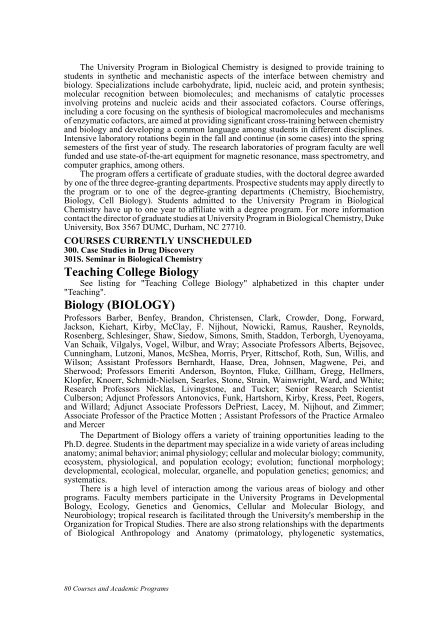2005-06 - Office of the Registrar - Duke University
2005-06 - Office of the Registrar - Duke University
2005-06 - Office of the Registrar - Duke University
Create successful ePaper yourself
Turn your PDF publications into a flip-book with our unique Google optimized e-Paper software.
The <strong>University</strong> Program in Biological Chemistry is designed to provide training to<br />
students in syn<strong>the</strong>tic and mechanistic aspects <strong>of</strong> <strong>the</strong> interface between chemistry and<br />
biology. Specializations include carbohydrate, lipid, nucleic acid, and protein syn<strong>the</strong>sis;<br />
molecular recognition between biomolecules; and mechanisms <strong>of</strong> catalytic processes<br />
involving proteins and nucleic acids and <strong>the</strong>ir associated c<strong>of</strong>actors. Course <strong>of</strong>ferings,<br />
including a core focusing on <strong>the</strong> syn<strong>the</strong>sis <strong>of</strong> biological macromolecules and mechanisms<br />
<strong>of</strong> enzymatic c<strong>of</strong>actors, are aimed at providing significant cross-training between chemistry<br />
and biology and developing a common language among students in different disciplines.<br />
Intensive laboratory rotations begin in <strong>the</strong> fall and continue (in some cases) into <strong>the</strong> spring<br />
semesters <strong>of</strong> <strong>the</strong> first year <strong>of</strong> study. The research laboratories <strong>of</strong> program faculty are well<br />
funded and use state-<strong>of</strong>-<strong>the</strong>-art equipment for magnetic resonance, mass spectrometry, and<br />
computer graphics, among o<strong>the</strong>rs.<br />
The program <strong>of</strong>fers a certificate <strong>of</strong> graduate studies, with <strong>the</strong> doctoral degree awarded<br />
by one <strong>of</strong> <strong>the</strong> three degree-granting departments. Prospective students may apply directly to<br />
<strong>the</strong> program or to one <strong>of</strong> <strong>the</strong> degree-granting departments (Chemistry, Biochemistry,<br />
Biology, Cell Biology). Students admitted to <strong>the</strong> <strong>University</strong> Program in Biological<br />
Chemistry have up to one year to affiliate with a degree program. For more information<br />
contact <strong>the</strong> director <strong>of</strong> graduate studies at <strong>University</strong> Program in Biological Chemistry, <strong>Duke</strong><br />
<strong>University</strong>, Box 3567 DUMC, Durham, NC 27710.<br />
COURSES CURRENTLY UNSCHEDULED<br />
300. Case Studies in Drug Discovery<br />
301S. Seminar in Biological Chemistry<br />
Teaching College Biology<br />
See listing for "Teaching College Biology" alphabetized in this chapter under<br />
"Teaching".<br />
Biology (BIOLOGY)<br />
Pr<strong>of</strong>essors Barber, Benfey, Brandon, Christensen, Clark, Crowder, Dong, Forward,<br />
Jackson, Kiehart, Kirby, McClay, F. Nijhout, Nowicki, Ramus, Rausher, Reynolds,<br />
Rosenberg, Schlesinger, Shaw, Siedow, Simons, Smith, Staddon, Terborgh, Uyenoyama,<br />
Van Schaik, Vilgalys, Vogel, Wilbur, and Wray; Associate Pr<strong>of</strong>essors Alberts, Bejsovec,<br />
Cunningham, Lutzoni, Manos, McShea, Morris, Pryer, Rittsch<strong>of</strong>, Roth, Sun, Willis, and<br />
Wilson; Assistant Pr<strong>of</strong>essors Bernhardt, Haase, Drea, Johnsen, Magwene, Pei, and<br />
Sherwood; Pr<strong>of</strong>essors Emeriti Anderson, Boynton, Fluke, Gillham, Gregg, Hellmers,<br />
Klopfer, Knoerr, Schmidt-Nielsen, Searles, Stone, Strain, Wainwright, Ward, and White;<br />
Research Pr<strong>of</strong>essors Nicklas, Livingstone, and Tucker; Senior Research Scientist<br />
Culberson; Adjunct Pr<strong>of</strong>essors Antonovics, Funk, Hartshorn, Kirby, Kress, Peet, Rogers,<br />
and Willard; Adjunct Associate Pr<strong>of</strong>essors DePriest, Lacey, M. Nijhout, and Zimmer;<br />
Associate Pr<strong>of</strong>essor <strong>of</strong> <strong>the</strong> Practice Motten ; Assistant Pr<strong>of</strong>essors <strong>of</strong> <strong>the</strong> Practice Armaleo<br />
and Mercer<br />
The Department <strong>of</strong> Biology <strong>of</strong>fers a variety <strong>of</strong> training opportunities leading to <strong>the</strong><br />
Ph.D. degree. Students in <strong>the</strong> department may specialize in a wide variety <strong>of</strong> areas including<br />
anatomy; animal behavior; animal physiology; cellular and molecular biology; community,<br />
ecosystem, physiological, and population ecology; evolution; functional morphology;<br />
developmental, ecological, molecular, organelle, and population genetics; genomics; and<br />
systematics.<br />
There is a high level <strong>of</strong> interaction among <strong>the</strong> various areas <strong>of</strong> biology and o<strong>the</strong>r<br />
programs. Faculty members participate in <strong>the</strong> <strong>University</strong> Programs in Developmental<br />
Bology, Ecology, Genetics and Genomics, Cellular and Molecular Biology, and<br />
Neurobiology; tropical research is facilitated through <strong>the</strong> <strong>University</strong>'s membership in <strong>the</strong><br />
Organization for Tropical Studies. There are also strong relationships with <strong>the</strong> departments<br />
<strong>of</strong> Biological Anthropology and Anatomy (primatology, phylogenetic systematics,<br />
80 Courses and Academic Programs









